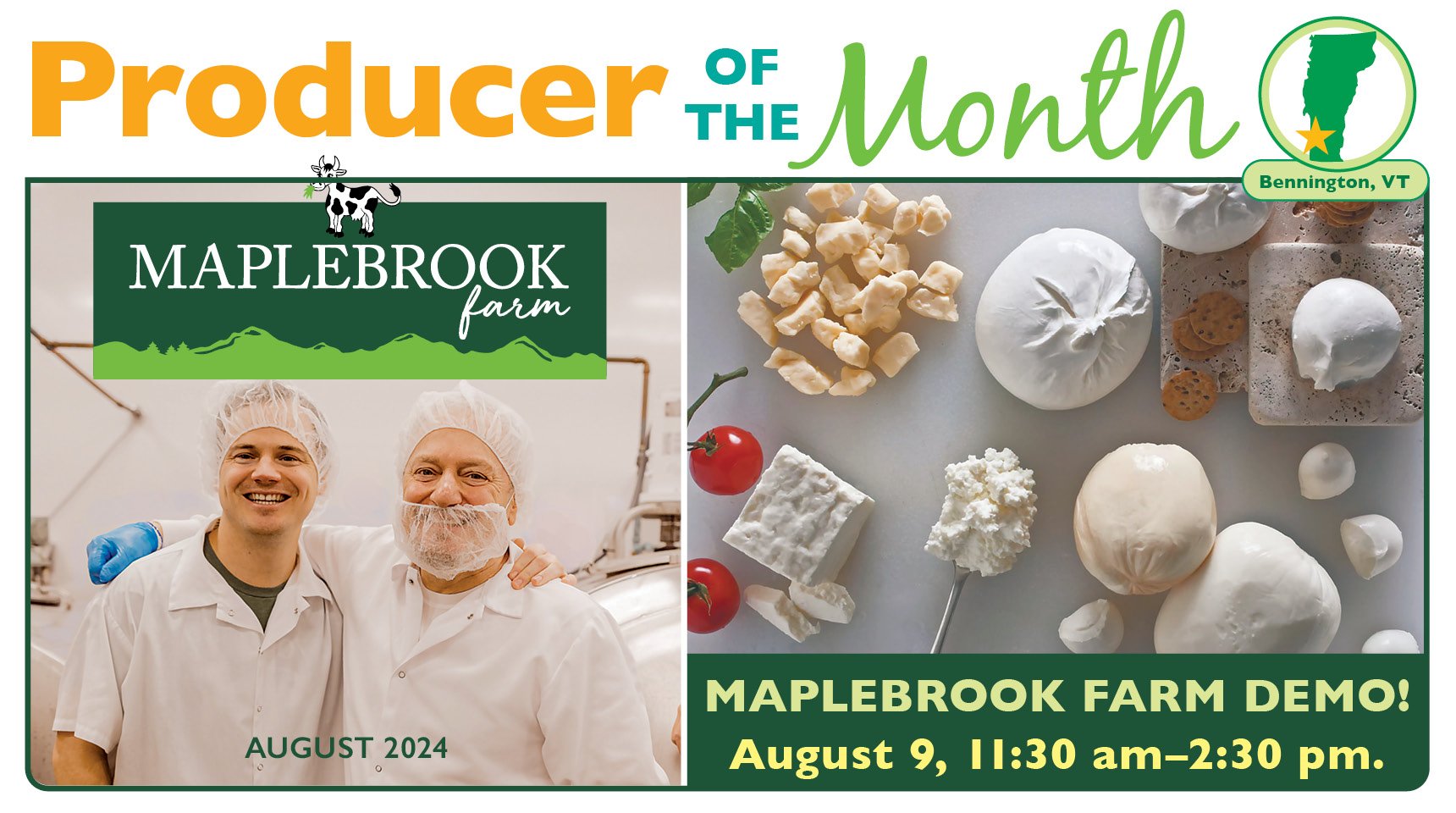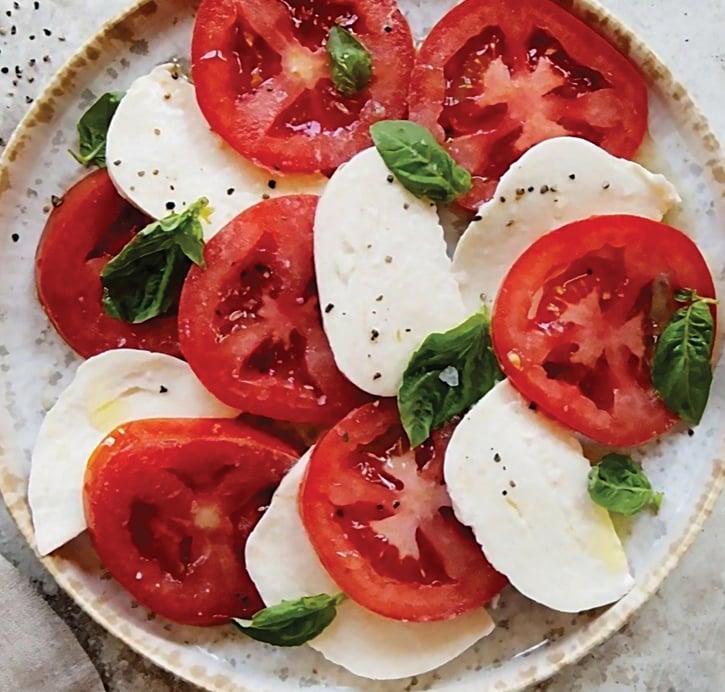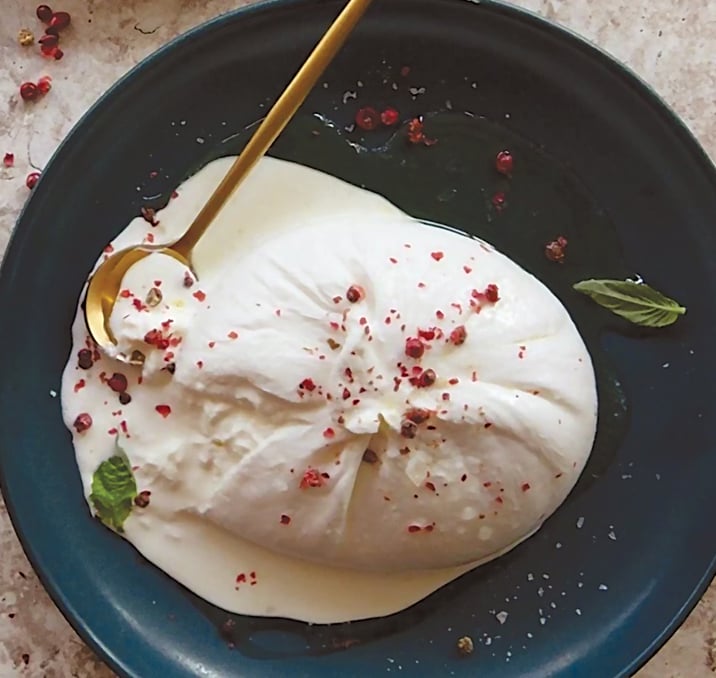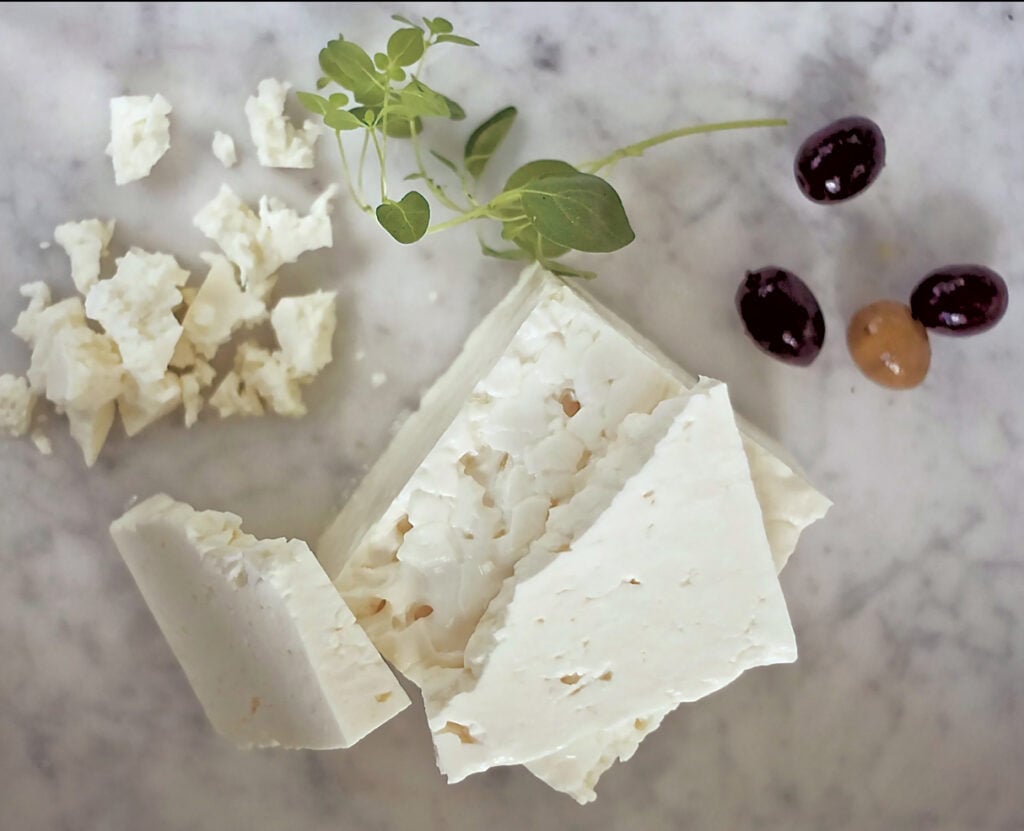Maplebrook Farm-Italian Fresh Cheeses Made in Vermont’s Green Mountains

If you’ve ever had Maplebrook Farm mozzarella, you know they are pillowy bundles of milky white softness. They’re made just on the other side of the mountain on Route 9 in Bennington, VT, by a second-generation Italian cheesemaker, the perfect fusion of Old World and New—artisanal technique and fresh local milk. For over twenty years, Maplebrook has made traditional Italian cheeses with prized Vermont dairy, growing their business and their array of products in the process.
In 2003, Mike Scheps was working at his father’s specialty food market, Al Ducci’s, in Manchester, VT, making fresh mozzarella the way he had learned from his father, who had learned from his father before him.
On one particular day, Mike served some of this hand-made fresh mozzarella to a woman from Boston: Johann Englert. Johann immediately understood how special it was: she hadn’t seen cheese like this since she was a young woman traveling in Italy. She purchased twenty mozzarella balls to bring back with her to Boston. Before she left, she asked Mike if they could provide more for her to take back to Boston in the future, and the answer was yes.
The mozzarella, with its clean, creamy flavor and texture, was an instant hit in Boston, and Johann and Mike became business partners. Mike was 38, Johann was 68.
In the beginning, Johann would load up her Chevy Tahoe with the cheese and deliver it to specialty shops in the city. Eventually, they needed more help, so they hired one employee, then two, and on and on until they needed a whole human resources department! They now have about sixty employees and produce about forty thousand pounds of cheese every week in their fifty-thousand-square-foot facility.
It’s still a two-family business: Mike, now almost sixty, leads the operations side of the company; his son, Mike Jr., is part of the team. Johann’s grandson, Alex Englert, handles sales and administration. Alex says that the twenty-eight years between him and Mike provide a nice balance of experience and wisdom alongside a fresh outlook and vision.
Perhaps the greatest development over Maplebrook’s two decades is their single-sourced milk. For the last seven years, all their cheese has been made from the milk of one Vermont dairy farm—a big achievement for a cheesemaking operation of their size. It took many years to make this a reality. It’s significant for a few reasons: the milk is cleaner (both in its flavor and hygiene), more consistent in its quality and fat content (4-4.4% depending on the season), and better for the environment. Typically, a business like Maplebrook would have its milk delivered from a centralized dairy co-op facility, where milk from the dairy farm cooperative members is trucked in and pooled collectively. Having the milk delivered straight from the farm to the facility means they have a smaller carbon footprint.
Mozzarella is both a seasonal food and an anytime food. After all, pizza, the mother of all mozz vehicles, is eaten year-round, as is string cheese. Cold-weather comfort foods like baked ziti and lasagna are, of course, popular mozzarella recipes, too. But right now—when the heirloom tomatoes are ripe and the basil is exploding—is when fresh mozzarella and burrata are really meant to be delighted in. Bring it all together with some extra virgin olive oil, balsamic vinegar, and a sprinkling of salt, and you have a simple but ecstatic meal and a magical marriage of incredible Vermont agriculture and Italian gustatorial alchemy. Pair it with a fresh baguette and zesty, cool white wine. What could be better? It is for this reason that Maplebrook does two-thirds of its business between June and August, with twenty-five people making mozzarella all day long.

Maplebrook mozzarella starts with the milk being heated in open vats, artisanal style. There’s no culture added, as there usually is with other types of cheese; the only thing they add is vegetable rennet. The milk is stirred and heated until it separates into curds (solids) and whey (liquid). The curds are then salted, and some of them are sold as-is—they make such a great snack, like a better version of string cheese, or you can use them in poutine, that French-Canadian pub-food classic. But most of the curds are reheated, stretched, and shaped into large “ovoline” mozzarella balls. Some of them are smoked using a cherry-wood cold offset smoker, which infuses them with fragrant, woody flavor and beautiful tan color, making them beautiful additions to summer antipasti boards.
Maplebrook’s other signature product is burrata. Burrata is mozzarella filled with stracciatella (aptly pronounced as stretch-a-tella), which is made by soaking mozzarella curds in cream. It’s a decadent pouch of incredibly rich, luxurious deliciousness, with a delicate sweetness that would go great with any fresh salad, or even blueberries and honey. Maplebrook burrata is sold at stores and also shipped directly to high-end restaurants around the country. During this season, Maplebrook produces eight thousand burrata every day.

Maplebrook also makes award-winning block-style feta cheese. Alex says feta is misunderstood because its more humble version—the super-salty crumbles found on salad bars—is what it’s known for. But Maplebrook’s is a solid, creamy brick that softens into a rich, piquant pleasure in dishes like frittatas and warm spinach salads. It’s sweeter and milder than its typical counterparts, and it has received one of the most coveted awards in cheese: first place in the American Cheese Society’s Whole Milk Block Feta category. As Alex says, “It’s dynamite.”

The Co-op also carries Maplebrook’s fresh ricotta cheese, a delicious and versatile ingredient for savory or sweet recipes, like lasagne, stuffed shells, cheesecake, or toast with cinnamon sugar.
Mike has been making cheese since he was fourteen years old. When he was a kid, back in the ‘70s and ‘80s, his family owned a huge cheesemaking operation in New Jersey. In fact, it was the largest mozzarella producer in the country. Eventually, that business fell apart, and Mike’s dad, Al, moved the family to Vermont, where they opened Al Ducci’s. Alex says Mike “has people skills on a whole other level”; from the sound of it, he is an incredible leader of the cheesemaking side of the Maplebrook operation. It seems like part of his gift is simply that he loves cheese. He jokes with Alex about getting a giant “cheese for life” tattoo on his arm.
Alex was extremely close to his grandmother Johann—so close with her that he left his youthful, metropolitan life in New York City to become her roommate in Vermont at the tender age of twenty-four. He spent a couple of years working at Maplebrook and then went back to school to get a degree in finance. After Johann passed in 2021, he and his family moved to Vermont, and he took over her role.
One of the major changes since Alex came on was the purchase of Ploughgate Creamery, another local Vermont small business. The founder of Ploughgate, Marisa Mauro, is a family friend of Mike’s and was a frequent visitor to Al Ducci’s. In fact, her experiences there are partly what inspired her to start making artisanal dairy products in the first place. When the business grew too big for her to handle on her own, she sought help from Mike, and it became clear that it would be a wonderful partnership. Maplebrook has owned Ploughgate since 2022, and Marisa is still part of the team, making ultra-high-quality small-batch cultured butter. The purchase also means that Alex, besides eating copious amounts of mozzarella, burrata, feta, and all the other decadent Maplebrook products, sometimes eats butter like an apple. It’s all part of the job.
Maplebrook is small in the way they do things, and while they’re quite large compared to many of the Vermont cheesemakers we carry, they’re still pretty tiny compared to larger companies. (They’re much smaller than Cabot but a lot bigger than, say, Parish Hill). Like many successful local Vermont businesses, their products are sold to a wide swath of our country—not shore to shore, but regionally, down the eastern seaboard from Maine to Virginia. They look forward to steady growth, but not too much or too fast; they enjoy what they do, and where and how they’re doing it.
From the beginning, Maplebrook has been “all about Vermont,” as Alex put it. Johann was very focused on highlighting Vermont’s great agriculture and made it part of Maplebrook’s mission to forefront those qualities and to support this place that Maplebrook calls home. Other mozzarella makers have brand names that call directly to an Italian heritage. Not so with Maplebrook. Johann made sure that the name and the logo, with its green hills and spotted cow, conjured a sense of the Vermont landscape and history of dairy farms. And it’s more than just the branding. Much like Brattleboro, Bennington is a small, beautiful Vermont community with its share of challenges, and Maplebrook does what it can to help.
Maplebrook is another inspiring local business that we are truly lucky to have on our shelves. Biting into one of their luscious burrata, it can seem almost too good to be true that we have such easy access to this fresh, wholesome, absolutely delicious food. There’s no better way to revel in the abundance of southern Vermont’s farms than to get out there and eat some great, freshly made mozzarella. Yum!
Maplebrook Farm Demo! Friday, August 9, 11:30 am-2:30 pm.
Written by Ruth Garbus
About Producer of The Month

Shop Online

On Sale Now!

